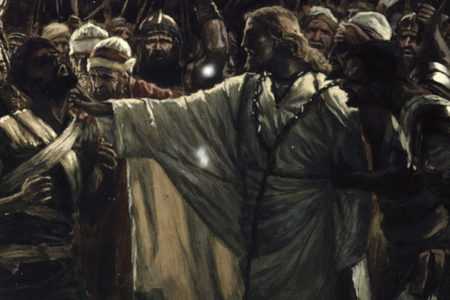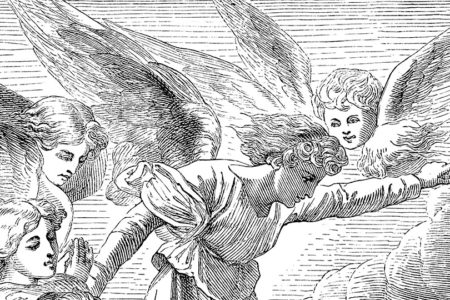Joseph of Nazareth
Greatness is usually not found where most people look for it—in the accoutrements of money, power, fame, and glory. Although these things rank high on the world’s scale, they could not be lower on God’s. He values humility, service, obedience, and a heart for others. High on His list was the heir to the throne of David who labored as a simple carpenter under Rome’s occupation of Judea. Joseph had little money, no kingdom, and no glory. But he loved mercy, walked humbly with God, and possessed a steadfast faith that enabled him to do a courageous work.
The Incarnation turned Joseph’s life upside down (Mt. 1:18–23). The Gospel of Matthew records Jesus’ birth from his perspective, opening with a plain declarative: “The book of the genealogy of Jesus Christ” (1:1). Matthew traces Jesus’ Messianic lineage as the “Son of David” and “Son of Abraham” (v. 1). These two titles tie Jesus to the prophetic promises of King (2 Sam. 7:13–16) and Redeemer (Gen. 3).
Betrothed to Mary, a godly Jewish girl whom he loved, Joseph no doubt was greatly distressed to learn she supposedly had been unfaithful to him and was pregnant (Mt. 1:18). In those days, a betrothal was legally binding even though the couple did not live together. The betrothal period typically lasted for one year, after which the bridegroom would go to his bride’s house, claim his bride, and bring her back to his father’s home. There they would consummate the marriage, and guests would gather to celebrate with a feast that would last for several days.
The custom was designed to prove the faithfulness of the pledge of purity the bride gave to her husband.1 If she became pregnant while betrothed, she was shown to be unfaithful; and he could divorce her. At first, Mary’s pregnancy probably shattered Joseph’s expectations for a faithful and loving marriage.
So he faced a dilemma. At most, according to the Mosaic Law (Dt. 22:20–24; Jn. 8:3–5), Joseph could have demanded that Mary be brought to the city gate and stoned to death. At least, he could have brought her to the city gate, exposed her infidelity, and demanded a divorce.
However, God knew Joseph’s character and his kind and loving heart. Joseph was a man of mercy, not a man bent on revenge. He was just and did not want to humiliate Mary (Mt. 1:19). So he decided not to make her situation public and to “put her away secretly” (v. 19).
While Joseph “thought about these things,” God sent an angel to him in a dream, who told him,
Joseph, son of David, do not be afraid to take to you Mary your wife, for that which is conceived in her is of the Holy Spirit. And she will bring forth a Son, and you shall call His name JESUS, for He will save His people from their sins (vv. 20–21).
Mary was pregnant through the miraculous work of the Holy Spirit. She had not been unfaithful. In fact, not only had Mary been faithful to Joseph, she had also been faithful to God. This pious Jewish woman’s Son would be named Jesus because, as implied in the Hebrew, He would save His people from their sins. This was no ordinary conception, and Jesus was no ordinary Baby.
Through the Incarnation, God was fulfilling prophecies He had given His ancient people Israel centuries earlier. The angel comforted Joseph and assured him that all that was happening to Mary was a fulfillment of Isaiah 7:14: “Behold, the virgin shall conceive and bear a Son, and shall call His name Immanuel.” God would dwell with man in the Person of Jesus the Messiah.
The Bible teaches that no one can look on God and live (Ex. 33:20; 1 Tim. 6:16). But through the Incarnation, God came near to man in a form that people could see, experience, and understand (Jn. 1:14, 18).2
Like Mary, Joseph believed God’s angelic messenger and willingly accepted and submitted to God’s plan. Mary could not rear the Messiah alone; she needed a husband, and her son needed a father. The Messiah also needed a father to give Him legitimacy and acceptance. And Joseph was the man. Joseph even submitted to God’s will by naming the Child Jesus, rather than following the custom of naming a son after a male relative.3
In the days to come, God would speak to Joseph three more times through dreams:
- To warn him to flee to Egypt (Mt. 2:13–14).
- To send him back to the land of Israel (vv. 19–20).
- To direct him away from Judea and to settle in Nazareth (vv. 22–23).
Each time God spoke, Joseph listened and obeyed. The announcement of the Incarnation led a simple man to do a courageous work. Scripture does not record Joseph’s acceptance and obedience through Joseph’s words but, rather, through his actions. Upon being awakened by the angel, he disregarded customs and demonstrated great faith and honor by immediately taking Mary to live with him and having no relations with her until Jesus was born (Mt. 1:25). His concern was to provide for her and the miraculous Child she was carrying.
God turned distress into joy, which Joseph would experience firsthand at the Incarnation of Israel’s Savior.
Joseph had nothing the world would admire today. But throughout eternity he will be known as a man of honor, faith, mercy, humility, and service—qualities that constitute greatness in the sight of God.
ENDNOTES
- Louis A. Barbieri, Jr., “Matthew,” The Bible Knowledge Commentary, John F. Walvoord and Roy B. Zuck (Wheaton, IL: Victor Books, 1983), 2:20.
- Ronald F. Youngblood, F. F. Bruce, and R. K. Harrison, eds., Nelson’s New Illustrated Bible Dictionary (Nashville, TN: Thomas Nelson, 1995), s.v. “incarnation.”
- David Noel Freedman, Allen C. Myers, and Astrid B. Beck, eds., Eerdmans Dictionary of the Bible (Grand Rapids, MI: Eerdmans, 2000), 946.







